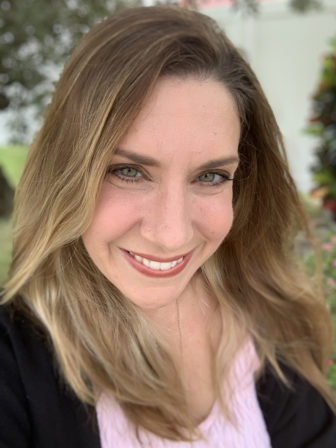
fizkes/Shutterstock
.
When we hear the words restorative justice, there is often a connection with the criminal justice system. But what if we brought “restorative” to child welfare and a civil legal system?
All humans are hardwired to connect. Just as we need food, shelter and clothing, human beings also need strong and meaningful relationships to thrive. Restorative practices is an emerging social science that studies how to strengthen relationships between individuals as well as social connections within communities.

Melissa Green
I have worked as an attorney in the child welfare system for many years. During this time, I have seen that the relationships our teenaged children have with their social workers and service providers are one of the greatest predictors of “success” in their adulthood. As we continue to work in our respective careers, we intuitively know what works. Many of us have always practiced in a restorative fashion, and have noticed system failings based on lack of community and connection. Restorative practices gives an explicit name and framework to this intuitive kind of work, and enables us to bring people together and train them in these helpful practices that can improve systems.
The International Institute for Restorative Practices explains that the term “restorative practices” derives from the restorative justice movement.
Research in restorative justice has revealed very positive outcomes for victims and offenders alike, including reduction in reoffending. Similar restorative practices in schools have yielded significant improvements in behavior and school climate as well.
Simply put, to be “restorative” means to believe that decisions are best made and conflicts are best resolved by those most directly involved in them. The restorative practices movement seeks to develop good relationships and restore a sense of community in an increasingly disconnected world. These practices have been applied in justice systems, families, workplaces and neighborhoods, as well as in schools.
Help for older teens
In my jurisdiction, there has been the recent development of “problem-solving courts” — small pilot projects to develop best practices. At this same time, there has been an increase in restorative practices in juvenile and criminal justice courts, as well as in schools, organizations, neighborhoods and families around the world. The combination of a therapeutic problem-solving court and a restorative practices-based approach would provide an uncharted offering of support for our system’s older teens, those graduating from foster care and celebrating their independence.
Teenaged youth who graduate from foster care have the opportunity to receive state benefits after their 18th birthday through state-funded programs. Sadly, many do not maintain the status required to keep these benefits and may become homeless or imprisoned. In response to this reality, we created a new program to help these youth develop better skills for success in adulthood by infusing restorative practices into the dependency system. The initiative also aims to redefine our traditional definition of success.
The Florida Bar Foundation is providing support to bring this program, HOPE Court, (Helping Older Teens Powerfully Engage) into fruition. It will begin as a pilot court project in Broward County, Fla., in early 2020.
The transition to independence is scary, often lonely and sometimes last minute. A restorative practices-based approach to the dependency legal system for these teens, one with its heart’s center on building relationships, building social capital and building community, would undoubtedly shine a light on these youth and offer a ray of hope.
Let’s change the language and the mindset of our current system. These special youth, who are our society’s next generation, are not “aging out” from confines; they are celebrating their independence and graduating from the care of our state into the care of themselves.
HOPE Court targets youth ages 17 plus, who will be graduating from the foster care system and entering into society independently as young adults. This pilot project offers an enhancement to the current dependency system process for older teens so that the youth’s relationship with social workers, service providers and the legal system will be established through restorative practices and community building, rather than through an adversarial manner.
Many of our HOPE Court youth will have experience with the juvenile justice system, or be at risk of delinquency. HOPE Court’s infusion of restorative practices encourages positive changes in behavior through community building. This will affect every aspect of our youth’s lives, creating a healing space in the child welfare system to help keep them out of other less desirable situations, including involvement in the criminal justice system.
The HOPE Court teens share the statutory permanency goal of APPLA, which stands for Another Planned Permanent Living Arrangement. In nonprofessionals’ terms, APPLA is the permanency goal utilized when all other options such as reunification of a family, adoption or permanent guardianship with a relative or nonrelative are not feasible.
APPLA, although the least preferred statutory goal, does not need to be the last priority. A lifetime of unspeakable trauma, uncountable placements and far too many educational and service provider upsets may not deliver the type of successful outcomes we typically measure for an average citizen. Let’s redefine success. Beyond traditional measures, we need to find value in the “simple” act of improving the social and emotional condition of these youth, of their human life, of their journey.
Additional support
HOPE Court can be the first step in building relationships and improving our current system. Implementation of the pilot has entailed partnership with Nova Southeastern University as our data partner. We have worked through development of the program and outcome measures, interagency understandings, training and logistical setup. The project will involve increased court hearings (once every six weeks) during the year prior to the youth’s 18th birthday. These court hearings will be conducted in circles, with the judge and will involve an interactive experience of circle sharing and problem solving.
Additional support services will be provided over the course of the year and will be delivered in circles, at a community location that provides many resources for our youth. Services will be organized into quarters via restorative “theme” and will guide our interactive circle discussions. Examples of the additional supports include supportive youth circles for transitional independent living planning, law enforcement peace circles, trauma-informed yoga classes and a financial literacy class that provides payment for attendance as well as starter funding for a bank account.
Currently, we are finishing our research approvals process, meeting with all community stakeholders, assembling the HOPE Court team, training the team and will be set to begin the special docket in early 2020. Our Unified Family Court dependency chair, Judge Stacey Schulman, will preside over HOPE Court. We anticipate the ability to share our data over time to develop a best practices model for expansion and replication. We take this on as a community, what we do for one, we do for us all.
Here’s hoping that this initiative will prove beneficial at providing our youth with the dignity and hopefulness they deserve as they navigate through the transitional independent living process. Nelson Mandela once said, “May your choices reflect your hopes, not your fears.”
That is one of my favorite quotes and I hope to live and breathe it in my personal and work life every day; I hope the same for you. Your work matters. You can change things. Believe that.
Melissa Green, Esq., is the restorative justice project director for the Children’s Advocacy Program at Legal Aid Service of Broward County, Inc. She has practiced as an attorney in the child welfare system since graduating from the University of Florida Levin School of Law in 2006.































